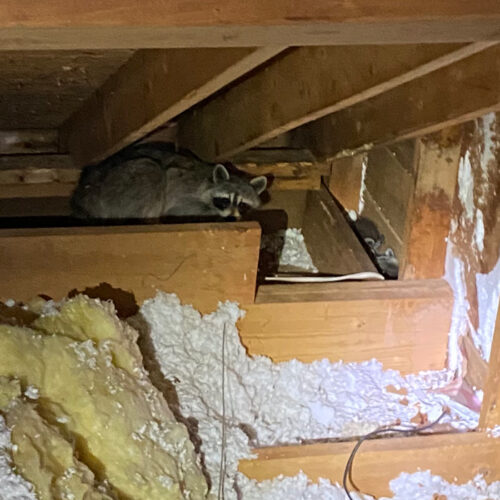Table of Contents
Raccoons in the Attic
Raccoons in White Plains can carry diseases that can make you sick. Most people know that many raccoons can carry rabies but that is just one of many. Here is a list of diseases that they can carry. This list may not include all the diseases raccoons carry but does include those that are most likely.
Rabies
Rabies is the most known disease that raccoons can carry. Rabies is a virus. It is transmitted through the bite of infected animals. It causes damage to the central nervous system. It eventually affects the brain and causes death. In humans symptoms include fever, headache, loss of muscle control, anxiety, inability to sleep even though you feel weak and tired, hallucinations, excess salivation, and inability to swallow. These progress until death occurs.
When trying to determine if a raccoon has rabies keep in mind that just being awake in the daytime and/or having no fear of humans is not a sign of rabies. If you do see a raccoon that has difficulty walking, is slow and disoriented, making loud noises (most raccoons looking for food will do so quietly), and foaming at the mouth or drooling that raccoon is most likely rabid. Get a safe distance away. Please contact a professional to deal with this animal.
Roundworm
This is a parasite. It is commonly found in raccoon intestines. Raccoons will not usually show signs of having the parasite. Eggs of the roundworm are in the feces of raccoons. Humans and pets can become infected through accidental ingestion of fecal matter. It can even happen through inhalation of dried fecal matter. This usually happens if you are cleaning up an area where raccoons have been using as their bathroom. Consider calling in a professional to remove contaminated materials. Humans exhibit signs that include skin lesions, eye and brain damage. Symptoms can include blindness, loss of coordination, nausea, and lethargy. Pets can shows signs that include tilting of the head, loss of coordination, rolling on the ground and lethargy
Distemper
This is a virus. This highly contagious virus results in a high fever, vomiting, and diarrhea. The animal becomes lethargic due to dehydration. Death usually occurs within a week. It is transmitted through all body secretions. Fleas and flies can also aid in transmission of this disease. This disease is not transmitted to humans but unvaccinated pet cats are at risk.
Salmonella
This is a bacteria. Raccoons can be carriers and suffer no symptoms. It can be transmitted to humans. The transmission happens through contaminated water, soil or fecal matter. It results in fever, diarrhea and abdominal cramps within 12 to 72 hours after infection. It can last 4-7 days. It can lead to dehydration and death and must be treated with antibiotics.

